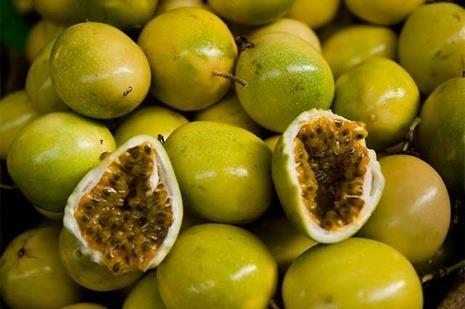Peruvian researchers are recovering Creole passion fruit variety
VU
Researchers of the National Institute of Agrarian Innovation (INIA, Peru) are recovering the Creole passion fruit variety. This variety has a better concentration of nutrients and high genetic quality, improved sweetness, and a thin rind.
The research is carried out within the framework of the project "Strengthening the technical productive capacities of passion fruit producers", financed by INIA through the National Agrarian Innovation Program (PNIA), supported by the Association of Exporters (ADEX) and by companies producing passion fruit.
The project began in 2018, at the request of passion fruit producers who were affected by the introduction to Peru of low-quality foreign seeds, which were later rejected by the fruit export industry, resulting in economic losses.
These seeds displaced the Creole variety of passion fruit, native to Peru, which has a high concentration of nutrients in its pulp and great sweetness. In addition, they do not require pollination to reproduce, they are resistant to droughts, diseases and pests, and they are available throughout the year.
Before, producers followed the recommendations of farmers and agrochemical sellers empirically, which did not give the expected results and, above all, the chemicals used were damaging the farmland and the environment.
To improve its competitiveness and profitability, there were developed training courses in crop management technologies for this variety; also there were elaborated diffusion materials and guides in the organic production of the fruit.
Besides, there were implemented demonstrative plots in the Barranca, Chimbote and Olmos production areas, so that growers knew how to install a passion fruit plant.
As a result of the research, 50 samples or accessions were initially collected from various regions of the country.
After a year of evaluation, with the physical-chemical characterization and organoleptic tests carried out in the INIA laboratory, the scientists selected 10 accessions that stood out for their sweetness and pulp quality, which is important for its commercialization in Peru and internationally.
Today, researchers examine the growth of the crop, its adaptability to different types of temperature, performance capacity in the field, and its resistance to diseases.
INIA is clonally propagating the “mother plants” to distribute them to the 3 zones: Chimbote, Barranca and Olmos, so that farmers have original seed, to avoid degenerations in genetic material, says María Elena Rojas Meza, principal investigator of the project.
Despite the pandemic, INIA's work did not stop thanks to the institutional cooperation agreement signed with ADEX.
Rojas estimated that until 2022 they will have results of the phenology evaluation of the 10 passion fruit accessions installed in the demonstration plots of those 3 regions.
She anticipates that the results of genetic improvement work on these crops will be obtained in 5 to 10 years.
source: andina.pe
photo: peruhop.com





